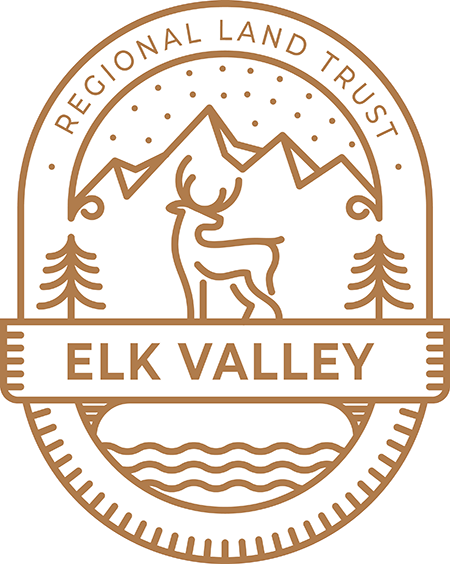How We Work
What is a Land Trust?
A Land Trust is a non-profit organization that works with private owners to acquire lands, or conservation covenants in private lands. The Land Trust then acts as a steward of that land, in perpetuity, to achieve specific conservation objectives reflected in a Stewardship Plan created for the property. You can learn more about Land Trusts and how they work by visiting the website of the Land Trust Alliance of BC here.
Why a Land Trust in the Elk Valley?
Repeated studies have established that the Elk Valley is a critically significant conductivity for large ungulates and bears. Those same studies Have established the Elk Valley Corridor is under substantial threat. Action must be taken to address and remediate the damage that has occurred thus far, and to prevent damage into the future.
Limiting and remediating that damage is not an easy thing. Government action and regulation in the Elk Valley is substantially constrained by the unique pattern of land ownership. Whereas 94% of forests are owned by the provincial government in BC as a whole (and managed under the 2002 Forest and Range Practices Act) over 32% of the forests in the Elk Valley are privately owned.
The very high proportion of private ownership in the Elk Valley makes it difficult for governments to regulate environmentally harmful conduct.
Where there are significant levels of private land ownership, Land Trusts are often a more effective response than government regulation. Because they enjoy all or some of the benefits of actual ownership, Land Trusts provide a means of addressing environmentally damaging behaviour while respecting the principle of private ownership. Land Trusts can do what governments cannot.
How Does the Trust Acquire Lands And Why Should Landowners Deal with the Trust?
Land Trusts acquire lands or covenants in either of two ways – by gift from the owner, or by purchase.
Owners who gift lands, or covenants in lands, do so for either or both of two reasons. First, they know that gifting a covenant in lands, or lands themselves, means that the lands will be conserved for future generations of human life and wildlife. Second, gifts of covenants or lands typically produce tax advantages for landowners, and sometimes very substantial tax advantages.
Land trusts can also purchase lands, or covenants in lands. In that event, the owner receives the market value of the property. The acquisition is made with funds donated from individuals and foundations. Individual and corporate donors receive tax benefits.
Some acquisitions are mixtures of gifts and purchases. These can allow the owner to enjoy both an income from the sale of a the portion of the property to the land trust and tax relief in respect of a portion of the property gifted to the trust.
What Lands are the Elk Valley Regional Land Trust Interested In?
The Elk Valley Regional Land Trust is specifically interested in lands on the eastern and western slopes of the Elk Valley, between Sparwood and Elko, which are suitable to establish a north-south connectivity corridor for wildlife. The Trust works with local landowners to acquire conservation covenants in those lands, or to acquire the lands themselves, in order to maintain that corridor.
Why Should Landowners Work with the Trust?
There are at least three reasons.
First, land trusts buy land. A landowner who wishes to sell land may find a ready buyer in the Trust, on commercial terms. The Trust is a market participant.
Second, landowners who wish to continue to own and occupy their land, and to pass it on, can often negotiate a conservation covenant with the Trust. Granting a conservation covenant to the Trust frequently qualifies the landowner for tax relief, and sometimes very substantial tax relief.
Third, in in the case of an outright sale or the grant of a conservation covenant, landowners know that they are participating in a critical project – the preservation and conservation of lands for future generations of human life and wildlife.
What is a Conservation Covenant?
A conservation covenant is an agreement between a landowner and a third party, such as a land trust, which requires that the landowner take agreed steps to conserve or rehabilitate the property. That agreement is registered against title to the property and binds the property in perpetuity. The landowner (and family and successors) may continue to occupy and to work the property, subject to the terms of the covenant.
In exchange, the landowner receives tax relief and/or a money payment. As importantly, the owner knows that his property will be preserved, forever, without necessarily interfering with his rate of enjoyment, and that of his successors. A conservation covenant is a win-win.
What Are the Tax Advantages to Donors and Owners?
Basically, individuals and corporations who donate money or capital property to a land trust are entitled to a non refundable tax credit, to be applied against taxes owing. The amount of the tax credit varies, but for donors with larger taxable incomes the credit can be in the order of 40 to 45% of the value of the donation.
Lands which are determined to be ecologically sensitive and are gifted to a qualified recipient fall into a special category. For these, the donor avoids all capital gains and is entitled to deduct 100% of the assessed value against income.
While we work as closely as we can with donors the Elk Valley Regional Land Trust does not offer tax advice. Donors must obtain independent advice with respect to the tax and other consequences of any donation.
Why a Land Trust in the Elk Valley?
Limiting and remediating that damage is not an easy thing. Government action and regulation is substantially constrained by the unique pattern of land ownership in the Valley. Whereas 94% of forests are owned by the provincial government in BC as a whole (and managed under the 2002 Forest and Range Practices Act) over 32% of the forests in the Elk Valley are privately owned.
The very high proportion of private ownership in the Elk Valley makes it difficult for governments to regulate environmentally harmful conduct.
Where there are significant levels of private land ownership, Land Trusts are often a more effective response than government regulation. Because they enjoy all or some of the benefits of actual ownership, Land Trusts provide a means of addressing environmentally damaging behaviour while respecting the principle of private ownership. Land Trusts can do what governments cannot.
How is the Elk Valley Regional Land Trust Governed?
EVRLT is governed by a Board of Directors. Membership on the Board is open to representatives of all conservation and user groups as well as governments in the Elk Valley. You can learn more about our background and our Board of Directors here.
What is Your Relationship With Groups Like the Nature Conservancy of Canada or the Nature Trust of BC
We are entirely separate organizations, with open lines of communication.
Groups like the NCC and Nature Trust operate nationally or provincially according to a set of national or province wide conservation priorities. Like all of us, they have limited funds. Lands that are critical to the environmental health of the Elk Valley may simply not “make the grade” on a national or provincial scale. But that doesn’t make them any less critical. We operate locally, according to local conservation priorities. Lands which are critical to the environmental health of the Elk Valley are our top priority.
EVRLT also has an additional mission. We live here. We take the Valley as it is. Our objective is to manage the interface between the natural environment and the human environment, to the benefit of both.
Is the Land Trust an Advocacy Group?
Not exactly. A Land Trust is a little different than other players in the conservation space. We support conservation advocacy, but we are not ourselves an advocacy group.
Our mission is different. Our job is to secure and manage lands for conservation and sustainable use. We do that by working with landowners to acquire lands, or conservation covenants in lands.
As noted, the defining characteristic of the Elk Valley is that it exists at the interface of the natural world and the human world. As the Cumulative Effects Management Study of 2018 established, that interface needs ongoing management.
At the Land Trust, we reject the idea that managing that interface is zero-sum game.
We are conservationists. We are users. We recognize that the relationship between the natural environment and the human environment in the Valley is one of interdependence. Balance is required.
Our purpose is to strive for and support that balance. We believe that recreational use can be managed in a way that preserves the natural environment. Science, commitment and effort can preserve the balance that has long distinguished the Valley.
Can Land Trusts Access Forest Carbon Offset Credits?
Yes. Where parcels being acquired are large – typically over 6000 acres, sophisticated land trusts are increasingly entering the carbon offset market. The Elk Valley Regional Land Trust has substantial experience in the is area.
How Does the Trust Decide Whether to Pursue a Given Parcel?
The Trust will engage in any parcel where the available data demonstrates that it is more likely than not that its involvement will achieve identifiable and legitimate conservation and/or rehabilitation objectives, as compared to the next most likely alternative use of the parcel in question. The Trust makes that determination on a case-by-case basis, with the assistance of its scientific and community advisors.
The Trust is also committed to balancing the interests of diverse recreational users with our conservation and preservation principles. This is so for one very simple reason – everything we enjoy about recreation in the mountains is a function of the natural environment. Without conserving and preserving wildlife, and the forests which support wildlife of all varieties, recreational use is substantially degraded, and, eventually, impossible. Our focus is on sustainable use.
How is EVRLT Governed?
EVRLT is a society incorporated under the BC Societies Act. It is governed by a Board of Directors composed of legacy directors as well as directors nominated by its member groups, which include the Fernie Trails Alliance, Fernie Mountain Biking Club, Tourism Fernie, and the Fernie Chamber of Commerce.

